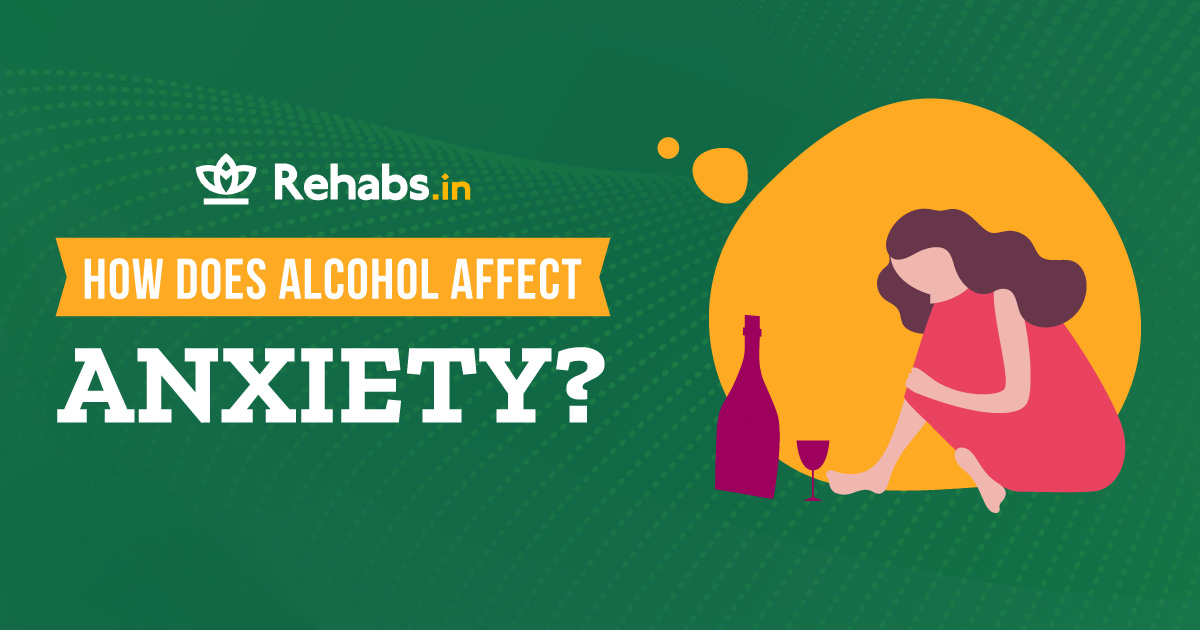Effect of Alcohol on Anxiety

Limited use of alcohol often doesn’t seem harmful. A small sip of alcohol or a couple of drinks at social gatherings is not very problematic. But if you have panic disorder or any other type of anxiety disorder, alcohol consumption may cause serious problems for you.
Alcohol is a substance that reacts with the central nervous system. Initially, the effect of it is euphoria, which may relieve anxiety for a short while.
But the long term effects of consuming alcohol are not so pleasant. Excessive use of alcohol may cause alcohol dependency and organ damage, including brain, liver, kidney, and heart failure.
Does Alcohol Cause Anxiety?
For many people, drinking is something to resort to after a long & stressful day. While alcohol may help to relax the nerves in the short term, in the long run, it may increase anxiety.
Alcohol affects the brain and increases the serotonin level in the mind causing you to feel euphoric. After a short while, the serotonin level drops down, making you feel depressed and anxious.
Direct Impact of Alcohol on Your Body During Anxiety
Alcohol can affect you in mainly six ways.
1. Mood
Alcohol alters your mood because it affects the level of serotonin. Serotonin helps to reduce stress and relax your mood. Serotonin is also associated with sexual desire and functions, appetite, sleep, and memory.
2. Blood Sugar Level
Drinking alcohol can cause your body’s sugar level to drop, which leads to confusion, dizziness, weakness, numbness, memory loss, shaking, and confusion. These symptoms also can lead to anxiety.
3. Dehydration
Dehydration doesn’t directly cause anxiety, but it can cause nausea, dizziness, confusion, headache, and muscle weakness. These symptoms can trigger anxiety.
4. Nervous system
Alcohol is toxic to your body. And your body goes into hyperactivity to remove the alcohol from your body. This mechanism can lead to nervous system failure. Insomnia, shaking, sensitivity to light or sound are some of the effects of alcohol on the Nervous system.
5. Heart rate
Alcohol consumption increases the serotonin level in your brain, which causes the heart rate to drop. It sends your body a false signal of anxiety.
6. Concentration
Chronic alcohol drinking can disturb concentration, and it can make you discombobulated. It leads to a higher sense of anxiety.
Effect of Alcohol on Anxiety
Many people use alcohol to cope with other emotional problems. Initially, after drinking alcohol, you may feel a bit relaxed, but in the long term alcohol has the potential to worsen your anxiety rather than cure it.
1. Alcohol makes you relax
Alcohol acts as a sedative in your brain and helps you to be more eased for a short time. As a result, you don’t feel social anxiety. But the sedative effects of alcohol are short term. After the effect wears off, you don’t feel the same result.
2. Drops the Serotonin Level
Serotonin is a hormone that helps you feel calm and happy. But as a depressant, alcohol decreases the serotonin hormone level in your body. It causes anxiety to increase.
3. You drink more to lose anxiety
As you drink more, your body builds tolerance, and you feel the need to drink more alcohol to get the same relaxation from stress. In the long run, this pattern of drinking can cause severe mental health problems.
4. Anxiety Hangover
Alcohol hangovers are the worst. You feel palpitation, dizziness, excessive sweating for no reason. But these symptoms can trigger anxiety because these effects are similar traits of anxiety.
5. Affect your short term memory
Alcohol affects your short term memory. Because of that, people tend to forget what they did after drinking. And worrying about that makes anxiety worse.
6. Develop alcohol dependency
A study by the USA showed that 20% of people who have social anxiety are suffering from alcohol addiction problems.
As you drink more and more alcohol, your tolerance increases, and you fall in the vicious cycle of drinking more to relieve anxiety.
7. Alcohol disrupts sleep pattern
Alcohol disrupts your regular sleep pattern, and it can affect your mood as well as happiness. Also, less sleep makes you more susceptible to anxiety.
A study conducted by the University of Missouri showed that if you drink alcohol to help you sleep, it disrupts your biological clock and sleep regulation.
Alcohol Use to Cope With Anxiety
Many people use alcohol as a self-medication to cope with anxiety.
A study conducted by the University of Buffalo Department of Psychology found that college students who drink alcohol to deal with anxiety have suffered from more alcohol-related problems than students who did not use alcohol.
Some studies have shown that a person’s anxiety level and alcohol consumption may be linked with his/her genetic characteristics.
Another study has shown that people with excessive drinking history are at an increased risk of developing PTSD after a traumatic event.
Prevalence of Alcohol Abuse in Anxiety Disorders
People suffering from anxiety disorders are three times more prone to develop alcohol addiction than those who don’t have anxiety. Studies have also shown that people with alcohol addiction are more prone to have some anxiety disorders.
Social Anxiety and Agoraphobia
People with social anxiety disorder or agoraphobia tend to drink alcohol to get over anxiety. For example, a person may feel anxious in a social setting with a lot of unfamiliar people. And to ease the feeling, they may self-medicate with alcohol. In the long term, this may turn into a full-fledged alcohol dependence disorder.
Generalised Anxiety and Panic Disorder
People with Generalised Anxiety Disorder and Panic Disorder usually have a different trend when it comes to alcohol use. They tend to begin drinking along with the symptoms of generalised anxiety and panic anxiety disorder. It means that the initial feeling of anxiety is related to alcohol withdrawal, and excessive use of alcohol helped to develop these symptoms.
Treatment of Alcoholism and Anxiety
Trying to self-detox on your own is highly dangerous. If you have alcohol disorder or anxiety disorder, you should consider taking professional help. There are many treatments for this kind of problem available, such as support groups, individual professional, and prescribed medication.
Medication Used for People With Anxiety
Benzodiazepine
Benzodiazepines are useful to treat severe acute anxiety symptoms. But it is not as effective as monotherapy because it can not treat the underlying causes of anxiety. Benzodiazepine is used to give quick relief from anxiety attacks. However, taking Benzodiazepine while on alcohol can be very dangerous because of the chance of an overdose or dependancy.
Commonly used Benzodiazepines are alprazolam(Xanax, lorazepam(Ativan), and clonazepam(Klonopin).
Selective Serotonin Reuptake Inhibitors (SSRIs)
To treat the underlying cause of anxiety, SSRIs are used. However, do not use alcohol while on an SSRI medication as the combination of both may leave you with low energy and tiredness.
Commonly used SSRIs are fluoxetine (Prozac), sertraline (Zoloft), Celexa, paroxetine (Paxil) and escitalopram (Lexapro).
Tricyclic Antidepressant
The tricyclic antidepressant used for treating anxiety includes maprotiline, doxepin, and clomipramine. However, alcohol may increase the sedative effects of anti-depression.
Monoamine Oxidase Inhibitors(MAOIs)
MAOIs are an alternative medication if other medications are not working well. However, taking MAOI, along with alcohol, may skyrocket blood pressure. Some examples of MAOIs are phenelzine (Nardil), tranylcypromine (Parnate), and isocarboxazid (Marplan).
Beta-Blockers
Beta-blockers are not standalone drugs for anxiety. But people take them with other medications to help treat some physical symptoms of anxiety-like sweating or trembling. However, drinking alcohol while taking Beta-blockers can be dangerous.
When to See a Doctor?
According to a study conducted by Substance Abuse and Mental Health Services Administration,7.9 million adults aged 18 more have suffered from co-occurring disorders in 2014.
Anxiety as a comorbid mental disorder can make your alcohol consumption problem much worse than a medically supervised inpatient treatment is needed. Some signs that indicate that you need professional help include:
- You avoid socialisation due to anxiety
- You distance yourself from friends, family and loved ones
- You have lost a job or opportunities due to anxiety
- Your sleep gets affected due to anxiety
- You feel your stress is out of control
- You don’t pursue your dream due to anxiety
With the symptoms mentioned above, if any of the following scenarios apply to you, consider taking an alcohol rehabilitation treatment service .
- You drink alone or drink during odd hours
- You feel drinking is affecting you physically but you can’t stop
- Your family and friends suggest you seek help
- You start to fear yourself and the person you’ve become after drinking alcohol
Lifestyle Changes to Reduce anxiety
Anxiety is a lifelong problem. It can be treated but can not be fully cured. However, you can tweak your lifestyle to reduce anxiety triggers and overall improve your life quality.
- Maintain a sleep routine. Around 6-9 hours of sleep is necessary for a person to function correctly.
- Reduce alcohol and caffeine intake. Both can increase anxiety.
- Be consistent with your meals. Eat healthy food.
- Meditation such as breathing and relaxation exercises every day.
Recovering from a co-occurring problem is not an overnight process. Recovery is a continuous process, and relapse is common. Having a support system beside you is crucial when you work towards recovery. It will help you recover faster and regain control of your life.














